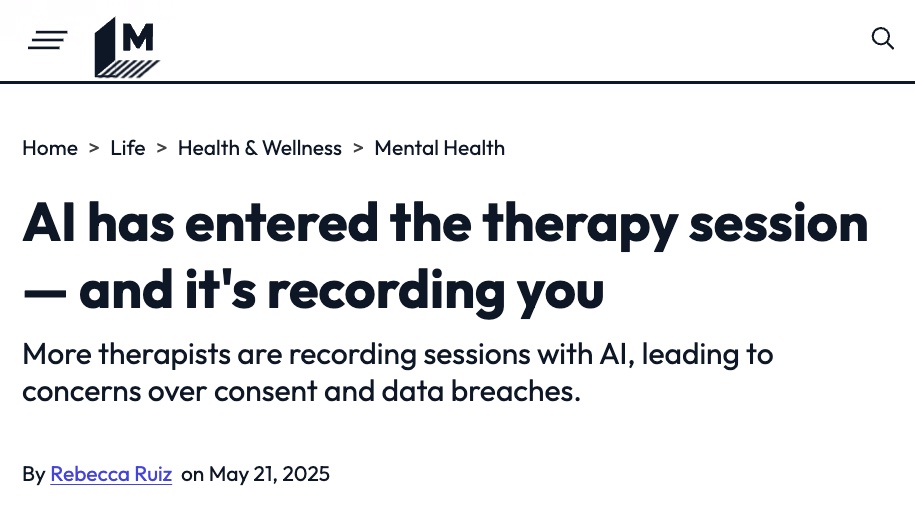Jon here! And I wanted our wonderful Quill community to know that I was recently included in a Mashable article about how some AI tools are encouraging the recording of therapy sessions. (And if you're a stranger to Quill and Jen and me, this is something we feel is not right and unnecessary.)
The article is titled: "AI has entered the therapy session — and it's recording you: More therapists are recording sessions with AI, leading to concerns over consent and data breaches." (And here's the link.)
For anyone that knows me in "real life", I'm more of an introvert. But this topic is near and dear to me. As a therapy client myself, I want my therapy sessions to continue to be private -- a place that I can talk about literally anything. Being married to a therapist, I recognize how under-appreciated and underpaid and overworked this line of work is, and the headache that is documentation (so I get the desire for tools to help save time). As a dad, I want my kids to be able to seek therapy one day too, and I don't want the therapeutic relationship to be eroded in the coming years. As a software engineer, I am well aware of the security and privacy implications of handling any sort of data -- but especially sensitive data like session recordings. (And if you can avoid handling this sensitive data -- which you can -- then you probably should!) And now with Quill, I know that I'm not alone with these sentiments, as so many therapists (like you!) love that we do not record therapy sessions.
Like I'm quoted in the article as saying:
"My biggest concern is that companies are quietly normalizing the mass recording of therapy sessions, and they're doing this often without a fully informed consent of all who are involved."
(Is it weird to quote yourself? Yes? What's the etiquette here?)
Some other tidbits that I found interesting:
John X. Jiang, the lead author of research on healthcare data breaches and ransomware attacks said:
"Ransomware attackers don’t need to leak this kind of data to do damage — they just need to make the threat credible."
(My take: I hadn't considered the blackmail vector of this!)
And Dr. Vaile Wright, senior director of the office of health care innovation at the American Psychological Association had this to say:
"The industry kind of jumped the gun a little bit without asking the question, 'Is this a good idea?' We just don't know the answer to that question... it feels like we skipped over it."
(My take: I hope the APA and other professional organizations say more about this critical topic, before it's too late and the ship has already sailed!)
So anyway, I hope you'll give this article a read. I appreciate that this topic is being covered, and I hope this is only just the beginning.

Here's the link if you missed it earlier: https://mashable.com/article/ai-therapy-recording-scribe